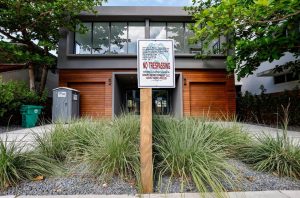One dozen choice, lush lots in the highly desirable real estate market of Coconut Grove.
Only qualified buyers may bid at an upcoming auction, and better be ready to beat the opening bid of $16.5 million.

As for the people who put down deposits and signed purchase contracts for eight of the 12 lots and the new homes that were supposed to be built on them — they can kiss their dream houses goodbye. Those buyers, who have been waiting on a Grove developer who never delivered and is now accused of fraud, will likely watch the Sept. 15 auction and see their properties sold, unless they can muster the money to bid on the entire portfolio.
Notices of the auction, which will be conducted via Zoom, were just posted, following approval of the bulk sale of the lots by Miami-Dade Circuit Court Judge Jennifer Bailey.
The auction is being held to raise money to help pay back $85 million that buyers, investors and lenders claim they are owed by developer Doug Cox, who bragged to clients that he was known as the “King of Coconut Grove.” ‘
We Need To Get Some Cash
Now Cox is broke, and at least $22 million in deposit money is missing, which leaves only the two dozen properties he owns as assets, Bailey said. Half the properties are undeveloped and half have nearly finished townhouses sitting on them.
“One of these bank accounts had negative $14 in it,” Bailey said at a recent hearing. “We need to get some cash so everyone can set upon it like ravenous dogs and try to get their fair share.”
Bailey compared the complicated case to “a baby bankruptcy.”
“There are no funds left and a lot of people with pitchforks,” Bailey said. “From lenders to depositors seeking their money back — and there may be a lawn care guy who will come forward, too, who knows?”
Bailey fulfilled an emergency request by Cox’s ex-business partner Phillip Sylvester to appoint former Miami-Dade Circuit Court Judge Alan Fine as receiver for the case in May. In his complaint, Sylvester warned that Cox was “depleting and wasting” various properties in a “fraudulent scheme.” Bailey authorized Fine to take over management of what’s left of Cox’s development companies and recover as much money as possible to pay claims.
“We’re trying to find a trail or path through this difficult scenario,” Bailey said. “I’m not sure there’s any benefit to having the receiver sit on undeveloped land.”
Lots Under Contract To Buyers
Eight of the undeveloped lots are still under contract to buyers, some of whom have waited years as nothing has happened on the properties. Cox, who has declined to answer questions from the Herald, hadn’t even pulled building permits. They’re surrounded by fencing with banners advertising Cox’s company, Drive Development, and renderings of sleek new homes. Four of the lots have old houses on them slated for demolition. The others are empty, aside from overgrown vegetation.
Among those holding contracts on the lots are Rafael Isola and Maria Del Mar Velez, who sued Cox on April 24, alleging “breach of contract, deceptive and unfair trade practices and fraud” stemming from their March 2022 purchase contract for an oak-shaded vacant lot and house to be constructed in the North Grove at 2050 Secoffee St. for $4.85 million. They gave him a deposit of $1.456 million. The couple included in their suit a photocopy of a bounced check from Cox that was to be a partial refund of their deposit.
Other lots are on Virginia Street, Gifford Lane, Day Avenue, Plaza Street and Woodridge Road — all in the Grove.

The total estimated value of all the Cox properties — the 12 lots and 12 houses — is $65-$69 million. Claims add up to $85.5 million, and the $22 million that Cox received in deposits has disappeared, according to Fine. He and his team of lawyers and forensic accountants are searching through bank accounts and “myriad transactions.” They’ve requested records for Send Enterprises and Drive Development, the companies run by Cox and his domestic partner Nicole Pearl, who is an attorney.
Cox signed double and even triple contracts with unsuspecting buyers on many of the properties, successively selling them for higher prices over the past five years as the real estate market skyrocketed. He stalled buyers with promises that their townhouses would be ready in 30-60 days, as soon as finishing touches were complete and certificates of occupancy were obtained, buyers say.
Four buyers gave Cox a total of $3.3 million in deposits on a single townhouse at 2960 Coconut Ave. Three people have contracts on it now, including one for $2.475 million with a $742,500 deposit from February 2022 and another for $2.375 million with a $1.52 million deposit from January. A third contract, amount unspecified, was signed in December, according to court records.
Sylvester, Cox’s ex-business partner, has agreed to put up $16.5 million to be the “stalking horse,” or first bidder. If he wins the auction, he would buy the properties he initially bought for $9 million five years ago and had planned to develop in a joint venture with Cox. Sylvester, originally from Chicago, first hired Cox as a general contractor on a few Grove houses in 2014.
Sylvester is suing Cox, claiming he was double-crossed. Sylvester says Cox showed him fake mortgage documents, broke their agreement and owes him $7 million.
Bailey heard objections to Fine’s auction proposal from purchasers who want their contracts honored and questioned Sylvester’s position as an insider receiving special treatment. But Bailey said she trusted Fine to “exercise his business judgment to make the best decisions to maximize assets and minimize liabilities.”
A local company called Liquidus submitted a Letter of Inquiry offering $55 million for all 24 properties but Bailey rejected it as a random bid from a firm that did not provide enough financial information.
“This is not let’s make a deal,” Bailey said. “I don’t believe it’s appropriate for a non-party to make a bid outside the receiver’s purview. I’m not going to go behind the receiver’s back.”
Lender Objects
An attorney for Altamar Financial Group, Mitchell Mandler, also objected to the auction.
“It would be better to wait rather than conduct a fire sale and place the bid proceeds into a bank, where it will earn little, as we litigate for a year,” Mandler argued.
But Bailey said the receivership needs an infusion of money not only to pay its legal bills but to start the process of sorting through and repaying claims.
“If you think this is a rush, you’ve never seen me rush,” Bailey said.
Altamar lent Cox and Send Enterprises $34 million in 2019, with most of Cox’s properties used as collateral. After Cox defaulted,
Altamar granted six extensions, then finally filed a foreclosure action in May. With penalty interest accruing at 24.5 percent, or $22,251.37 per day, Cox’s debt has ballooned to $43 million. The properties Cox put up as collateral are worth more today than the debt he owes to Altamar.
While Mandler argued that Altamar deserves to be repaid first, Altamar’s loan is being scrutinized by Fine and claimants’ lawyers.
Bailey called Altamar’s 24.5 percent interest rate “the elephant in the room, because no one in the world has that rate.
“It’s the deal of the century,” Bailey said. “Although Cox has not closed a home sale since 2019, you were giving them extension after extension and sending inspectors out to see finished houses that weren’t selling. What you’re saying is, ‘Me first.’”
Fine and Sylvester’s lawyer also criticized Altamar for refusing to meet and consider an offer from Sylvester to settle the loan.
“We intend to file a counterclaim against Altamar,” said Marcos Jimenez, Sylvester’s lawyer and former U.S. Attorney in Miami. Jimenez has described Cox as running a “Ponzi scheme.” “My client offered to cure, which Altamar ignored. So for Altamar to walk in and expect a credit bid is not realistic. Those things will be aired out in litigation.”
Bailey also approved paying $25,368 to Miami real estate broker Vivian Dimond, her bill for helping to assess and market the properties and expedite final inspections to obtain certificates of occupancy on the townhouses.
How To Bid At Auction
Bid procedures may be obtained from the public docket in the receivership case: https://www2.miamidadeclerk.gov/ocs/Search.aspx (Docket 252, 253, 254) Or by emailing counsel to the Receiver, Berger Singerman LLP at senddataaccess@bergersingerman.com.
Source: Miami Herald
DON’T MISS OUT ON YOUR COCONUT GROVE DREAM HOME. VISIT GROVEGUY.COM!

